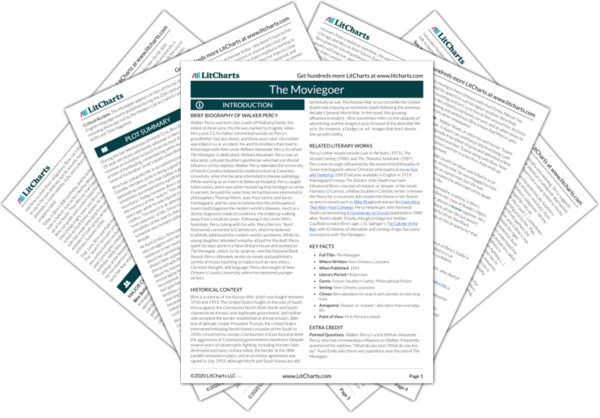Vehicles symbolize the journey through life, particularly a person’s journey alongside others. More than being a passive transport from one place to another, vehicles provide an opportunity for a person to interact with the world around them and arrive at a clearer understanding of their place in the world. Sometimes this backfires; for example, Binx’s car trip with his girlfriend Marcia becomes an obstacle to the journey when Binx becomes preoccupied with his car as a paragon of American culture and fears that his life (including his romance with Marcia) doesn’t match the cultural ideal. For that reason, Binx often prefers bus and streetcar travel to the more isolated, anonymizing experience of driving a car. On public transportation, like New Orleans’s buses and streetcars, Binx can observe a variety of people, wonder about what makes them tick, and ponder his own place in the world. Also, his train journey with Kate between New Orleans and Chicago—besides being a literal journey—provides a kind of intermission from daily life during which he and Kate are forced to figure out the nature of their relationship and their future together.
Cars, Buses, Streetcars, and Trains Quotes in The Moviegoer
[O]n my first trip to the Gulf Coast with Marcia, I discovered to my dismay that my fine new Dodge was a regular incubator of malaise. Though it was comfortable enough, though it ran like a clock, though we went spinning along in perfect comfort and with a perfect view of the scenery like the American couple in the Dodge ad, the malaise quickly became suffocating. We sat frozen in a gelid amiability. Our cheeks ached from smiling. […] I longed to stop the car and bang my head against the curb.
Joy and sadness come by turns, I know now. Beauty and bravery make you sad […] and victory breaks your heart. But life goes on and on we go, spinning along the coast in a violet light […] We pull into a bay and have a drink under the stars. It is not a bad thing to settle for the Little Way, not the big search for the big happiness but the sad little happiness of drinks and kisses, a good little car and a warm deep thigh.
It was ten years ago that I last rode a train, from San Francisco to New Orleans, and so ten years since I last enjoyed the peculiar gnosis of trains, stood on the eminence from which there is revealed both the sorry litter of the past and the future bright and simple as can be, and the going itself, one's privileged progress through the world. But trains have changed. […] Our roomettes turn out to be little coffins for a single person. From time to time, I notice, people in roomettes stick their heads out into the corridor for some sight of human kind.
[…] [I]f only somebody could tell me who built the damn station, the circumstances of the building, details of the wrangling between city officials and the railroad, so that I would not fall victim to it, the station, the very first crack off the bat. Every place of arrival should have a booth set up and manned by an ordinary person whose task it is to greet strangers and give them a little trophy of local space-time stuff—tell them of his difficulties in high school and put a pinch of soil in their pockets—in order to insure that the stranger shall not become an Anyone[.]
It pleases [the salesman] to speak of his cutter and of his family down in Murfreesboro and speak all the way to Union City and not once to inquire of me and this pleases me since I would not know what to say. Businessmen are our only metaphysicians, but the trouble is, they are one-track metaphysicians. By the time the salesman gets off in Union City, my head is spinning with facts about the thirty five cent cutter. It is as if I had lived in Murfreesboro all my life.












